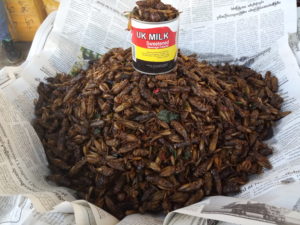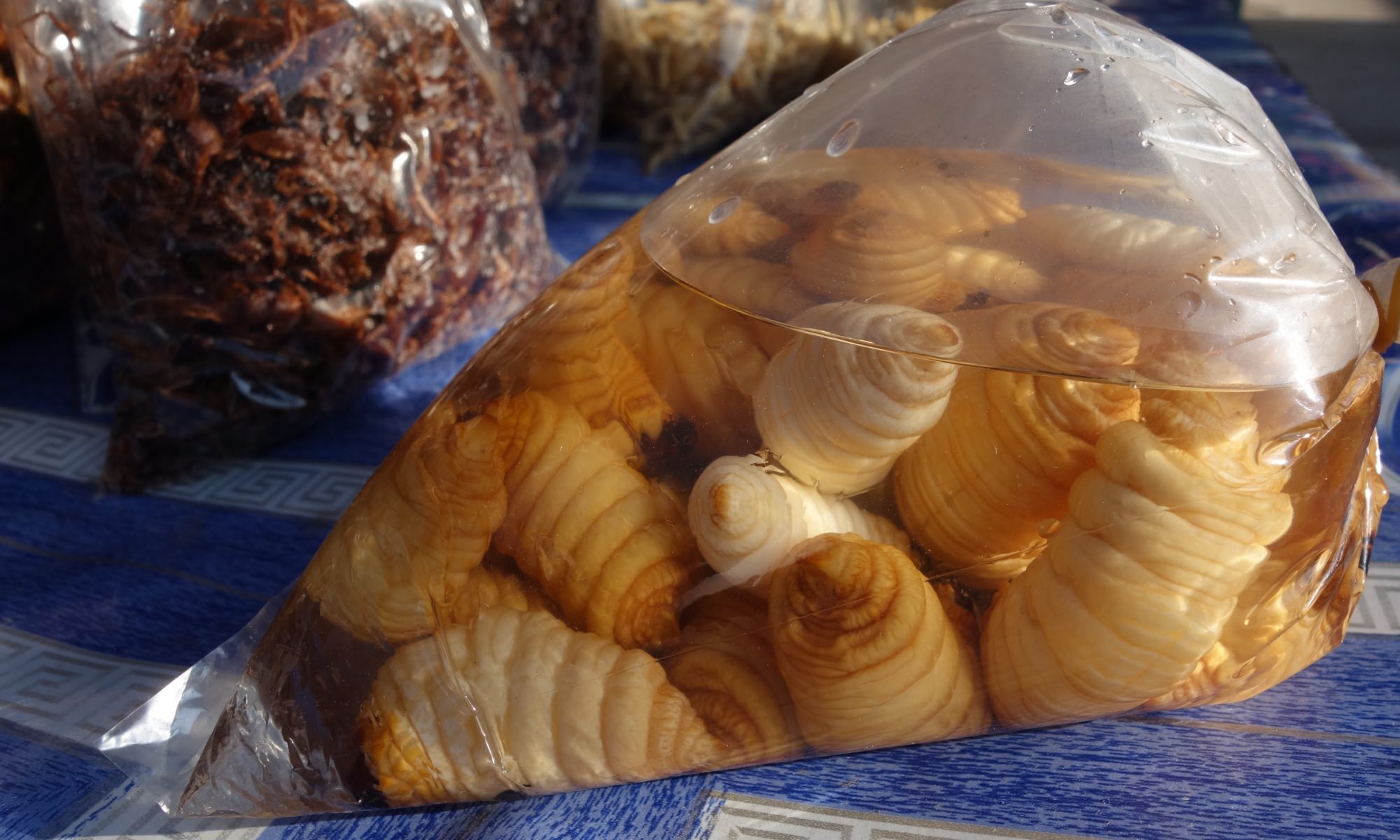By Sarah Nischalke and Sebastian Forneck
Finding people who love to feast on insects and collect them from the wild, handing them a few plastic boxes with simple trays for vegetable waste from the kitchen, water and for egg laying/breeding- and ready is the mini-livestock farm that produce crickets, locusts or other insects that go into processing for snacks made of insect flour, and, voila: there is a vibrant insect market…
That at least was our vision when the first activities of the ProciNut project (production and processing of edible insects for improved nutrition) started in Madagascar, Myanmar and Thailand for the German Federal Ministry of Food and Agriculture in 2018.
Thanks to the Novel food regulation of the European Union in 2018, insects are known in Europe today as a nutritious and ecological food source, and supermarkets or online-traders offer a small selection of products such as protein bars or insect pasta. However, most people just want to give it a try, and so the market is still far from taking off due to a lack of repeat-purchases. It’s not only that there are so many other choices of food, but insect-based products are still relatively expensive, and the taste of freeze-dried insects – the only option available in Europe – still needs to catch up with freshly produced delicious cricket and pennywort salad (Recipe book “Everyday Insects” by Ei Phyu and Spectrum) in Myanmar or a plate of freshly fried bamboo worms prepared in the Krok Mai Thai Lao Restaurant in Bangkok.
Over 2100 edible insects – an environmentally friendly protein source
Insects have made it to the experimental food agenda though and bear a particularly large potential as feed source in the Global North. In the Global South they are a substantial part of food culture already, and are, according to the FAO, eaten regularly by more than two billion people in 118 different countries. Over 2,100 species of edible insects are consumed, mostly beetles, hymenoptera (bees, wasps, and ants), grasshoppers and butterflies. The value of insects as food source lies in their protein content which is as high as in conventional meat products including all essential amino acids, in addition to various micronutrients and vitamins. Their production also comes along with environmental advantages, as it has high food conversion rates, needs little space and water, and emits comparatively low levels of CO2 -especially in places where the temperatures meet their natural habitats of warm climate.
In many Southern countries, insects sold at the local markets help to provide income, especially for women. Women are often responsible for the collection of insects from the wild as part of their daily routine, and a small-scale industry of mostly female insect sellers at local markets has evolved in many countries around the world.

However, harvesting insects from the wild is putting insect populations under pressure, especially because urban consumption of edible insects is rising, and methods of insect harvesting have become more professional over time. Moreover, egg-bearing female insects are often seen as delicacies and receive higher prices. Insect consumption from the wild can also have adverse health effects because they accumulate chemicals used in agriculture which is – unlike in other food sources – not tested.
Rearing insects instead of harvesting them from the wild
One approach to benefit from edible insects while avoiding the disadvantages of wild harvesting is to encourage rearing. In Thailand which is maybe the most famous country for edible insects, a booming insect industry has been created over the last decades. Over 27,000 cricket farmers alone exist within the country. The example of Thailand shows what is possible with the right amount of private and governmental support.
Worldwide mostly five to ten of the 2100 edible species are used and researched for rearing. Regarding all the other local species, very little is known on their suitability for rearing, the optimal conditions for their production and viability, which requires much more research; especially that starting an insect business does not require a large investment. But people need to be able to purchase simple equipment and eventually additional feed for the insects or the adult generation.
What surprised our research team the most during the first research phase was the fact that people who like to eat insects or even collect or catch insects are not necessarily interested in setting up their own mini-livestock farm. First of all, they miss the perception that it is possible to rear insects. Secondly, people are neither aware about the nutritional value, nor about the potential as a viable livelihood source. Thirdly, insects from the wild have the reputation of having higher quality and better taste. And, in addition to knowledge constraints due to lacking access to information sources such as YouTube or training centres, as well as economic constraints of lacking capital to invest in insects, other social and cultural barriers can come in between. In Kenya, for example, it was found that the whole village needed to approve insect rearing, so that it was not associated with witchcraft activities. In Myanmar, Buddhist ways of thinking can cause concerns that the mass killing of insects can lead to bad karma. To conclude, awareness raising is needed on all levels from farm to policy as well as reaching out to universities and agricultural advisory services, who need to consider all these aspects to push the insect sector forward.
—————————————————————————————–
Note: This work was financially supported by the German Federal Ministry of Food and Agriculture (BMEL) based on the decision of the Parliament of the Federal Republic of Germany.
A nice infographic containing many of the aforementioned information can be found here.
The rearing part of this blog post is based on a more detailed article on rearing in Myanmar, Madagascar, Thailand and Kenya published here.
Sarah Nischalke is senior researcher at the Centre for Development Research at the University of Bonn (ZEF) and PI of the ProciNut project. She is a passionate social scientist with a fascination for food, other cultures and nature. For twelve years she has been conducting research into farming and food systems as social entities as well as into food culture and eating behaviour, always with special consideration of women and gender issues.
Sebastian Forneck is a Junior Researcher at the Centre for Development Research of the University of Bonn (ZEF). He holds a master’s degree in Sociology graduated from Bielefeld University. He is affiliated with studies on belonging and home, food and food sovereignty, as well as socio-economic and environmental change.
Images: Ingo Wagler, Myanmar

